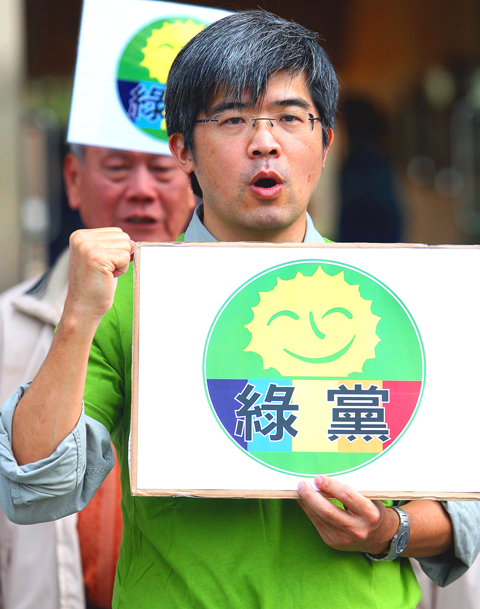Green Party Taiwan (GPT) has nominated former party secretary-general Calvin Wen (溫炳原) for the legislative byelection in Taipei City's sixth constituency, vowing to bring its green platform and to raise environmental awareness in the legislature.
The byelection will be held on March 28 following the resignation of Chinese Nationalist Party (KMT) legislator Diane Lee (李慶安) earlier last month over allegations that she holds dual citizenship. The US Department of State recently confirmed that Lee's US citizenship is still valid. The Nationality Act (國籍法) bans government officials from holding dual citizenship.
“We wanted to nominate someone who can represent us well. We selected Wen because he had been involved with GPT since its founding in 1996, so he has a good grasp of the international Green [parties] and how to connect with them,” GPT Secretary-General Pan Han-shen (潘翰聲) said yesterday.

PHOTO: CNA
Wen said the main thread in his campaign policy was to transform Taiwan's economy into a green one.
“By collecting carbon taxes and capping carbon emissions, public transportation systems will be made more efficient and there will be fewer private cars on the road,” he said.
“Although GPT will only have one seat in the legislature [if elected], I will be the people's eyes and ears in the legislature. I will report to my voters any under-the-table deals,” he said.
Wen's nomination came as a surprise, as GPT had said it would choose a nominee from three potential candidates — Pan, US-born naturalized Taiwanese Robin Winkler (文魯彬) and the party's founding member Chang Shu-mei (張淑玫).
Winkler's announcement that he would bid for GPT's nomination had drawn wide attention, with the Chinese-language media portraying him as the “opposite” of Lee. However, the Nationality Act states that a naturalized Taiwanese cannot run for public office until at least 10 years after his or her naturalization. Winkler was naturalized in 2003.
Asked if Winkler knew that he was not eligible to enter the election, Pan yesterday said: “[Winkler] thinks that there is room [to work with].”
When asked to elaborate, Pan said Winkler could look into the law and obtain candidacy as an independent candidate through registration and appeal.
When telephoned for confirmation, Winkler said: “Yes, I have not given up yet.”
In related news, although the Central Election Commission (CEC) revoked Lee's elected status as Taipei City councilor and legislator, it will not ask her to return election subsidies she received for the elections.
The election law states that a candidate who receives more than a certain number of votes in an election is eligible to receive NT$30 for each vote he or she receives. Having been elected as Taipei City councilor in 1994 and as legislator in 1998, 2001, 2004 and 2008, Lee had received more than NT$8.6 million (US$251,000) in election subsidies.
“Unlike the President and Vice President Election and Recall Act (總統副總統選舉罷免法), the Election and Recall Act for Public Servants (公職人員選舉罷免法) only requires the elected person to give up foreign citizenship before taking the oath of office,” the CEC said in a statement released late on Tuesday. “Having foreign citizenship, according to the law, does not block anyone from running in the election, and thus the CEC would still compensate the candidate.”
ADDITIONAL REPORTING BY LOA IOK-SIN

Alain Robert, known as the "French Spider-Man," praised Alex Honnold as exceptionally well-prepared after the US climber completed a free solo ascent of Taipei 101 yesterday. Robert said Honnold's ascent of the 508m-tall skyscraper in just more than one-and-a-half hours without using safety ropes or equipment was a remarkable achievement. "This is my life," he said in an interview conducted in French, adding that he liked the feeling of being "on the edge of danger." The 63-year-old Frenchman climbed Taipei 101 using ropes in December 2004, taking about four hours to reach the top. On a one-to-10 scale of difficulty, Robert said Taipei 101

A preclearance service to facilitate entry for people traveling to select airports in Japan would be available from Thursday next week to Feb. 25 at Taiwan Taoyuan International Airport, Taoyuan International Airport Corp (TIAC) said on Tuesday. The service was first made available to Taiwanese travelers throughout the winter vacation of 2024 and during the Lunar New Year holiday. In addition to flights to the Japanese cities of Hakodate, Asahikawa, Akita, Sendai, Niigata, Okayama, Takamatsu, Kumamoto and Kagoshima, the service would be available to travelers to Kobe and Oita. The service can be accessed by passengers of 15 flight routes operated by

Taiwanese and US defense groups are collaborating to introduce deployable, semi-autonomous manufacturing systems for drones and components in a boost to the nation’s supply chain resilience. Taiwan’s G-Tech Optroelectronics Corp subsidiary GTOC and the US’ Aerkomm Inc on Friday announced an agreement with fellow US-based Firestorm Lab to adopt the latter’s xCell, a technology featuring 3D printers fitted in 6.1m container units. The systems enable aerial platforms and parts to be produced in high volumes from dispersed nodes capable of rapid redeployment, to minimize the risk of enemy strikes and to meet field requirements, they said. Firestorm chief technology officer Ian Muceus said

MORE FALL: An investigation into one of Xi’s key cronies, part of a broader ‘anti-corruption’ drive, indicates that he might have a deep distrust in the military, an expert said China’s latest military purge underscores systemic risks in its shift from collective leadership to sole rule under Chinese President Xi Jinping (習近平), and could disrupt its chain of command and military capabilities, a national security official said yesterday. If decisionmaking within the Chinese Communist Party has become “irrational” under one-man rule, the Taiwan Strait and the regional situation must be approached with extreme caution, given unforeseen risks, they added. The anonymous official made the remarks as China’s Central Military Commission Vice Chairman Zhang Youxia (張又俠) and Joint Staff Department Chief of Staff Liu Zhenli (劉振立) were reportedly being investigated for suspected “serious